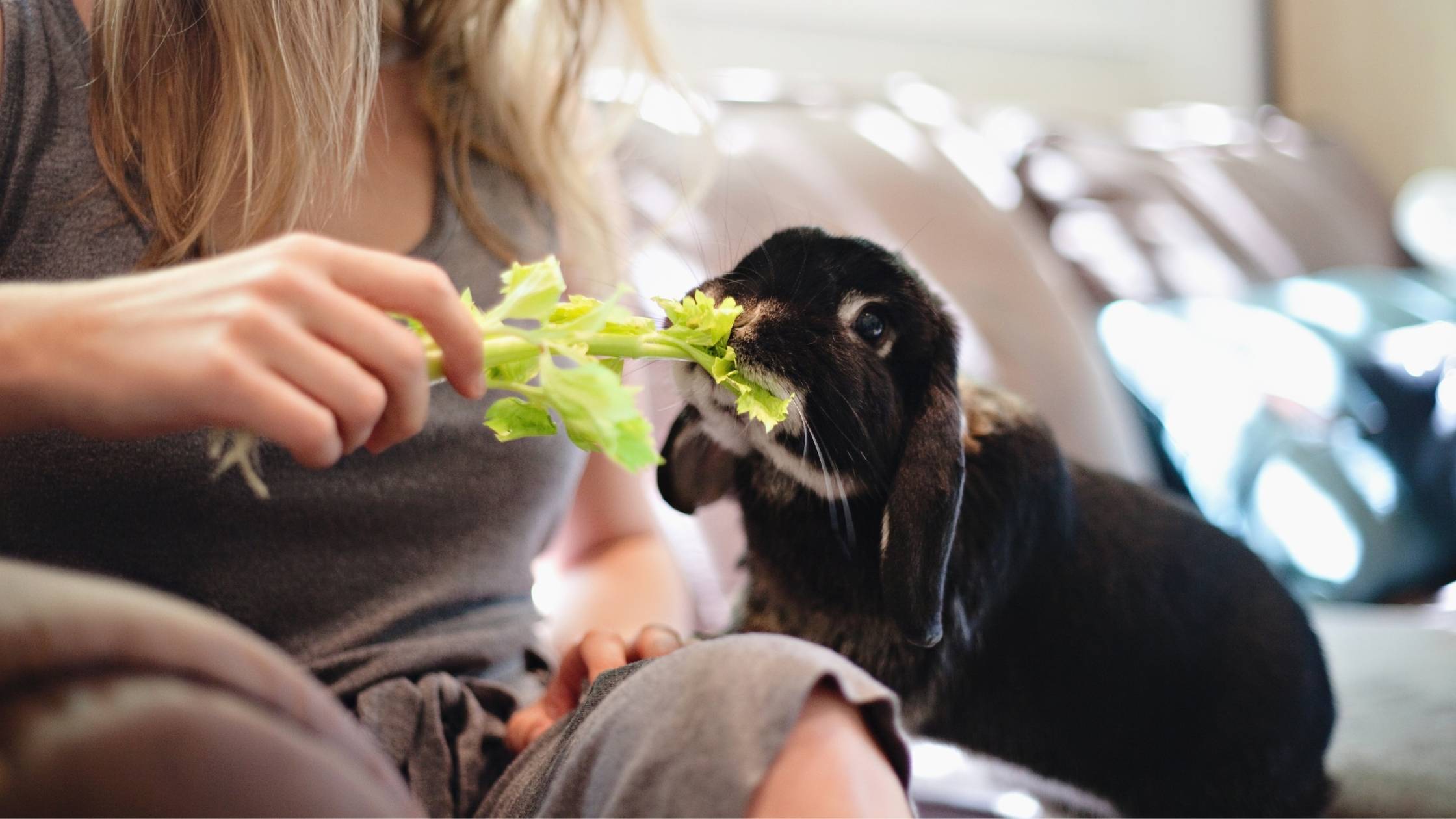Last Updated on 08/20/2021 by Veronica Jones
Rabbits eating grass, hay and carrots is common knowledge. As pet owners, we want to give the best to our bunnies. So we keep on looking for ways to keep them happy and healthy. When we talk about healthy human food, celery is on top of the list. But can rabbits eat celery? Is it safe for them? We will find out in this article.
Can Rabbits Eat Celery?
Yes, rabbits can eat celery. In addition to dried grass or hay, rabbits also need supplements from fresh produce, such as leafy vegetables or root vegetables. Celery fits in both categories.
Celery is one of the healthiest food for rabbits to eat. It is rich in nutrients like vitamins C, A, B6, iron, and fiber. Rabbits can eat celery as part of their vegetable intake, making up to 15% of a rabbit’s healthy diet.
Celery leaves are rich in nutrients and the crunchy texture of the sticks is perfect for helping bunnies grind their teeth. Since celery is not a leafy green vegetable, it should be fed in small quantities. Nevertheless, it is a perfect snack or an occasional treat for rabbits.
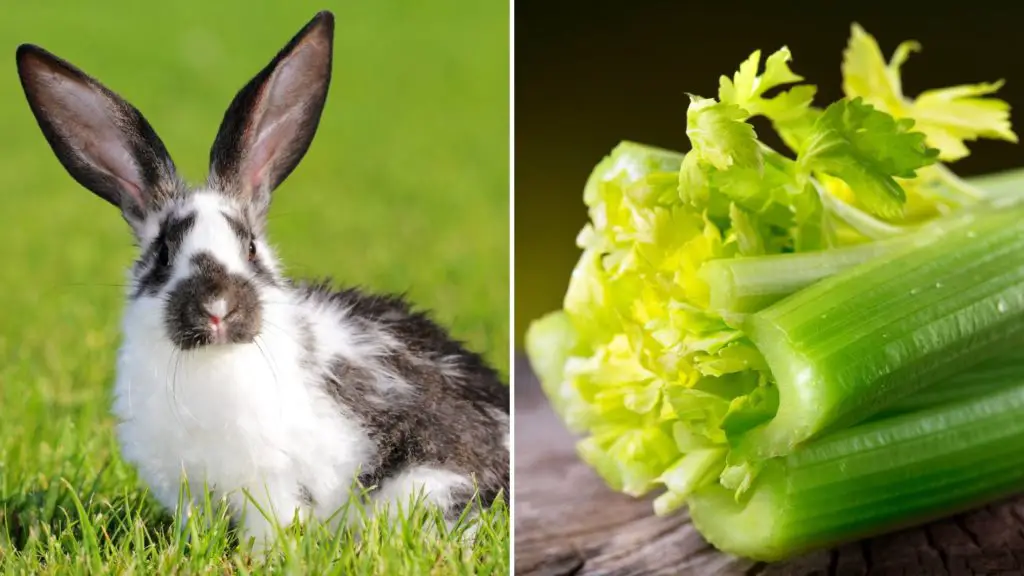
Benefits of Celery for Rabbits
There are a lot of benefits when you feed rabbits with celery.
Firstly, celery is rich in Vitamin K, which helps with bone metabolism. It is also rich in Vitamin C which protects and heals damaged cells and Vitamin A which is good for vision.
It also contains minerals and nutrients beneficial for a rabbit’s health like calcium (good for rabbit’s teeth), choline, fiber, folate, folic acid, iron, magnesium, phosphorus, potassium, zinc and vitamin E.
Another vital benefit found in celery is folate, also known as folic acid.
It is essential to help produce new cells that will prevent the development of some cancers.
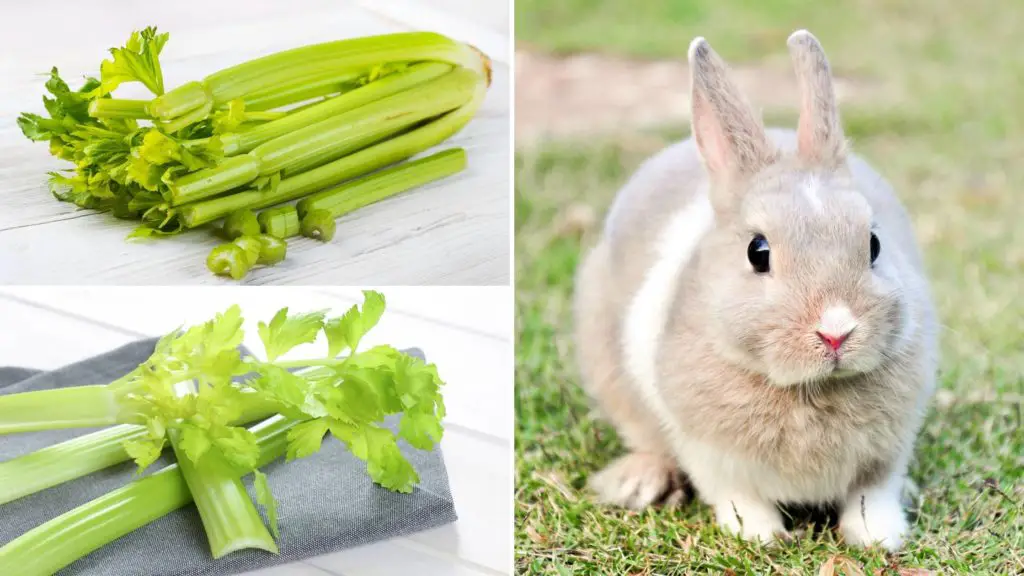
Secondly, did you know that rabbits’ teeth never stop growing? Giving you pet rabbit celery can check how strong your bunny’s teeth are due to crunchiness and difficulty to chew. A rabbit’s teeth need to be checked regularly to make sure it doesn’t grow into its gums. That situation is very painful and crucial for a rabbit, so it needs to be prevented.
Just like any other food, too much celery is also not good for your pet. Follow the recommended daily amount of celery intake to keep your rabbit healthy.
What is a Celery?
Celery is a vegetable that is part of the Apiaceae family, same with carrots, parsnips, parsley, and celeriac. It has a crunchy stalk that makes the vegetable popular for its low calories and many health benefits.
It has a fibrous stalk and leaves that have a savory taste. It is rich in fiber and can be eaten raw or cooked. The fiber content of the celery is suitable for the digestive and cardiovascular systems. It also contains antioxidants that are good prevention for severe illnesses like cancer.
Is Celery Safe for Rabbits?
Yes, celery is safe for rabbits. It has a lot of nutrients, vitamins and minerals that are very helpful in keeping your rabbit healthy and live longer.
While the nutritional contents of celery don’t pose any risk to rabbits, the physical attributes of the vegetable can be a potential risk.
.
Celery has long, thin fibers that can be a health risk to rabbits. These fibers are too long that if eaten whole, these long threads can get stuck between the teeth, or worse, in the throat, quickly becoming a choking hazard that might cause the rabbit’s death.
A situation that may harm your rabbit should be prevented. There is a perfect way to feed celery to your rabbits, depending on the size of the rabbit. Read on to know more.
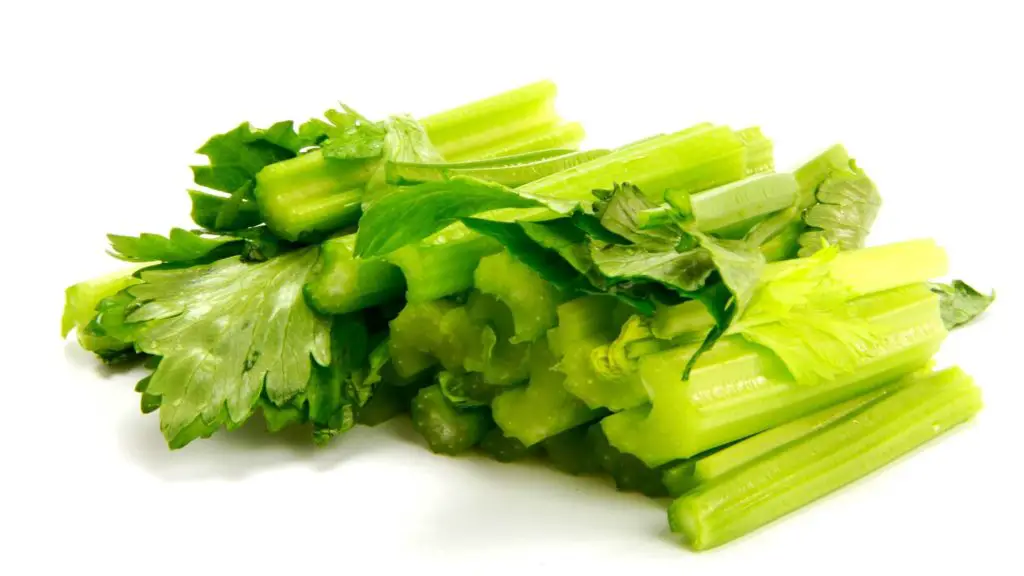
How To Prepare Celery for Rabbits
When giving celery to your rabbit, the first thing to remember is to cut the stem into small pieces. The size will depend on the size of your rabbits.
The standard size is between ½ inch to 1 inch per piece. This measurement can work both on small and big bunnies. Cutting the celery that way will prevent the risk of choking, keeping your rabbits safe.
Another thing to consider is the amount of celery you give to your rabbits. Just give your rabbits a small amount of celery each day. Fresh hay is still the best food where rabbits get the most nutrients, so feeding them with a lot of snacks like celery might stop them from eating the right amount of hay for the day.
The recommended celery intake for a rabbit is ½ stock per day.
What Happen When I Give My Rabbit Too Much Celery
Feeding your rabbits more than the allowable daily intake is not exactly harmful. It will not lead to adverse effects like death. It will only lessen the amount of hay they eat since they ate celery instead of the hay, which is their primary food. A rabbit’s balanced diet should be 75% hay.
Health Risk of Feeding Celery to Rabbits
Celery is considered one of the healthiest vegetables that you can feed your rabbit. However, just like anything else, there is a risk if not given properly. Here are the possible dangers of feeding celery to rabbits that you should be aware of.
- The celery string strings can be caught between the rabbit’s teeth, causing them pain. It can also choke them if not chewed properly and may cause blockages in the digestive tract.
- Rabbits like celery because of its sweet flavor. Yes, it is sweet and that is because they are high in sugar compared to other vegetables. Too much sugar intake can cause health problems for rabbits.
- Celery contains a lot of water, like cucumbers. If a rabbits’ diets are too high in water, this can cause gastrointestinal problems such as diarrhea.
- Celery also contains oxalic acid, which is safe in small amounts. Eating a lot of celery will increase oxalic acid in their body that might cause damage to the kidney.
These problems can be avoided. It is essential to follow the right way in preparing the celery before giving them to your rabbits. Chop them small enough so they can chew and swallow them easily.
.
The high amount of sugar, water and oxalate content can be controlled by feeding celery in small amounts each day. Remember, the celery is just a snack or an occasional treat, not a daily staple. It should be served along with other fruits and vegetables the rabbit can eat.
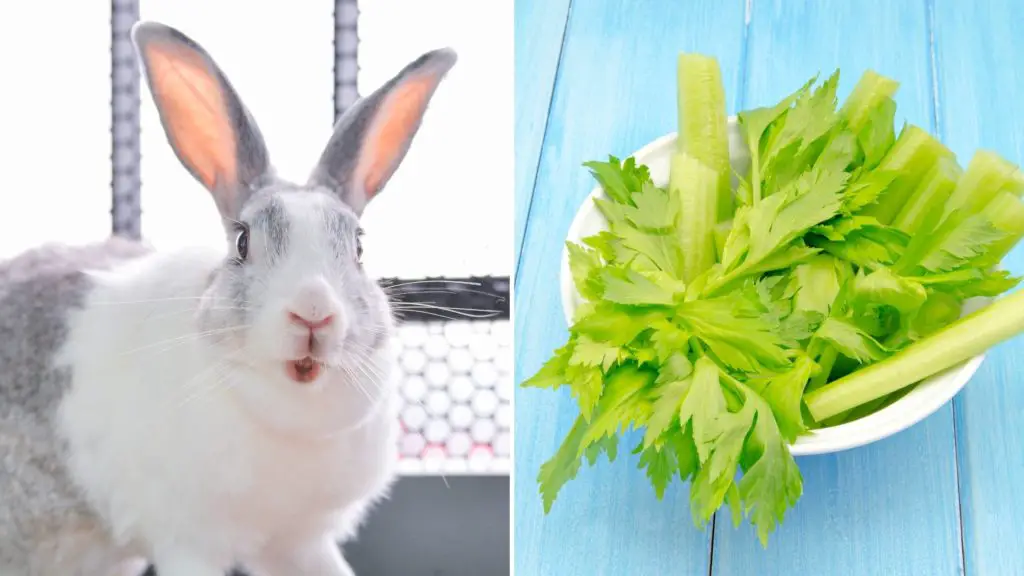
Things to Remember When Feeding Celery to Rabbits
When giving celery to your rabbit, the most important thing to remember is to cut it into small pieces. The best size is ½ -1 inch per cut. By doing this, the long fibers of the celery are cut short, eliminating the risk of choking.
Also, remember to just feed your rabbit only a small amount of celery. Only ½ stock per day is recommended.
Rabbits need to continue eating fresh hay. Unfortunately, too much celery can get in the way of their daily intake of hay.
It is safe for rabbits to eat celery. Introduce it to them slowly, one step at a time, for them to get used to the taste and texture. Do not force your rabbit to eat something they don’t want to.
Moreover, observe your rabbit after eating the celery. Make sure they don’t have a negative reaction. If there is an adverse reaction, consult your veterinarian right away to check the problem before it’s too late. If your rabbit develops loose stool or diarrhea, stop giving them celery and monitor their condition.
What is a Rabbit’s Healthy Diet
Like any other animal, rabbits need to eat a balanced diet. They need to get the required nutrients their body needs.
A rabbit’s diet consists mainly of plant-based foods such as fruits and vegetables, hay and pellets. This is where rabbits get the vitamins and minerals to keep their body healthy and live longer. However, not all fruits and vegetables are safe for rabbits.
Aside from carrots, celery is also best for bunnies. In the remaining parts of this article, we will talk about the benefits, the risks, and how to feed rabbits with celery in the right way.
Conclusion
Most rabbits love celery. It is safe and suitable for them given the right amount and preparation.
Just be sure to follow the recommended serving size of ½ a celery stick per day.
It is important to be observant and be hands-on in taking care of your rabbits. However, just like in humans, what works well with the other rabbit doesn’t mean it will work for everybody.

